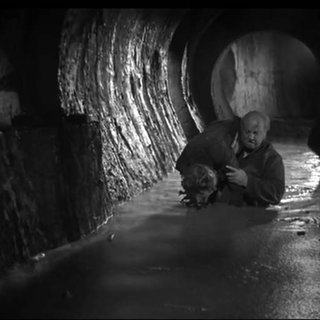Thursday
Tuesday, as I was awaiting my first Covid shot (!), I was listening to the scene in Les Misérables where Jean Valjean is groping his way through the sewers of Paris. The elation I felt upon receiving the shot bears some resemblance to what Jean Valjean experiences upon seeing the glimmer of the exit light after his nightmarish trek. In fact, the entire episode is a fitting image for the world’s Covid experience this past year.
Jean Valjean’s first descent into the sewer is as disorienting as the early days of the pandemic:
By degrees, we will admit, a certain horror seized upon him. The gloom which enveloped him penetrated his spirit. He walked in an enigma. This aqueduct of the sewer is formidable; it interlaces in a dizzy fashion. It is a melancholy thing to be caught in this Paris of shadows. Jean Valjean was obliged to find and even to invent his route without seeing it. In this unknown, every step that he risked might be his last. How was he to get out? should he find an issue? should he find it in time? would that colossal subterranean sponge with its stone cavities, allow itself to be penetrated and pierced? should he there encounter some unexpected knot in the darkness? should he arrive at the inextricable and the impassable? would Marius die there of hemorrhage and he of hunger? should they end by both getting lost, and by furnishing two skeletons in a nook of that night? He did not know. He put all these questions to himself without replying to them. The intestines of Paris form a precipice. Like the prophet, he was in the belly of the monster.
When I was 11 and visiting Paris sites with my family, the boat trip we took through the sewers of Paris was a far cry from Jean Valjean’s experience. As he carries the unconscious Marius, he encounters a patrol that fires at him, a rat that bites him, and quicksand that very nearly swallows him up. This final ordeal almost proves too much, even though he manages to escape:
However, although he had not left his life in the fontis, he seemed to have left his strength behind him there. That supreme effort had exhausted him. His lassitude was now such that he was obliged to pause for breath every three or four steps, and lean against the wall. Once he was forced to seat himself on the banquette in order to alter Marius’ position, and he thought that he should have to remain there. But if his vigor was dead, his energy was not. He rose again.
At this point, however, he literally experiences a glimmer of hope. Think of it, perhaps, as the moment we learned that a successful Covid vaccine had been developed:
He walked on desperately, almost fast, proceeded thus for a hundred paces, almost without drawing breath, and suddenly came in contact with the wall. He had reached an elbow of the sewer, and, arriving at the turn with head bent down, he had struck the wall. He raised his eyes, and at the extremity of the vault, far, very far away in front of him, he perceived a light. This time it was not that terrible light; it was good, white light. It was daylight. Jean Valjean saw the outlet.
Despite his extreme fatigue and hunger, Jean Valjean is buoyed up:
A damned soul, who, in the midst of the furnace, should suddenly perceive the outlet of Gehenna, would experience what Jean Valjean felt. It would fly wildly with the stumps of its burned wings towards that radiant portal. Jean Valjean was no longer conscious of fatigue, he no longer felt Marius’ weight, he found his legs once more of steel, he ran rather than walked.
He is not home free yet, however, as he discovers an impenetrable grating barring his accent. Some governors are also prematurely rejoicing, lifting mask mandates and dropping indoor gathering restrictions:
It certainly was the outlet, but he could not get out.
The arch was closed by a heavy grating, and the grating, which, to all appearance, rarely swung on its rusty hinges, was clamped to its stone jamb by a thick lock, which, red with rust, seemed like an enormous brick. The keyhole could be seen, and the robust latch, deeply sunk in the iron staple. The door was plainly double-locked. It was one of those prison locks which old Paris was so fond of lavishing.
On the other side of the grating is (in our case) prospects of neighborhood July 4th barbecues, visits to grandchildren, and normal Thanksgivings. Jean Valjean imagines escaping both the military patrols that are hunting down revolutionaries and Inspector Javert, who has been dogging his steps for years. Ahead is a return to his beloved adopted daughter Cosette:
Beyond the grating was the open air, the river, the daylight, the shore, very narrow but sufficient for escape. The distant quays, Paris, that gulf in which one so easily hides oneself, the broad horizon, liberty. On the right, downstream, the bridge of Jéna was discernible, on the left, upstream, the bridge of the Invalides; the place would have been a propitious one in which to await the night and to escape. It was one of the most solitary points in Paris…
Fortunately, in an unexpected twist, he escapes the sewers, and life returns to normal, with a heartfelt reunion and a wedding. Our own Paris awaits us, but we must stay patient and disciplined for a few more months.
